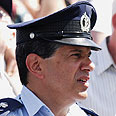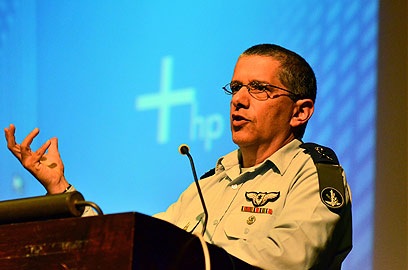
The escalating public discourse over the possibility of a strike on Iran's nuclear facilities has put a magnifying glass on incoming IAF Chief Major-General Amir Eshel's stance on the issue.
Eshel, whose IAF appointment was announced Monday, seldom expresses his opinion publically – all the more so since becoming the head of the IDF's Plans and Policy Directorate in 2008.
Related articles:
- 'Eshel will prepare perfect attack plan'
Amir Eshel named next IAF chief
Syrian 'chemical, biological' weapons concern Israel
But in a rare speech made last month at the Jerusalem Center for Public affairs, Eshel stressed that while the decision to launch an airstrike on the Islamic Republic is left up to the political echelon, Iran is Israel's primary concern.

Eshel: Iran's above all else (Photo: Roni Aviv, Bamahane)
"Iran is above everything, and it must be taken into account, strategically, before the others," he said. "A nuclear Iran would cause a mighty change in the region. It would trigger an arms race in the Middle East. I'm sure that other nations in the region will attempt to obtain such weapons as well.
"It could create a situation that leads to a global nuclear jungle," he added. "This is not an official assessment, but the first lesson that leaders in the Middle East learned from the Arab Spring is that they should obtain nuclear weapons ... Who would have dared to question (Gaddafi) or Saddam Hussein if they had atom weapons?"
Eshel raised the concern that a nuclear Iran could embolden terror groups that operate with the Islamic Republic's backing, including Hamas and Hezbollah – a development that would restrict the IDF in Gaza and Lebanon.
Iran precedes Israeli-Palestinian conflict?
He argued that the Iranian issue even trumps Israel's conflict with the Palestinians, saying that an agreement with the PA won't bring peace to the region.
"Even if Israel and the Palestinians sign a peace accord tomorrow, it won't solve the other problems or the Iranian issue," he said. "An agreement with them won't create a paradise in the Middle East. I don't belittle the issue, but if (the agreement) isn't based on solid security arrangements, it won't last."
Eshel noted that as per the government's order, the IDF supports the Palestinian apparatuses in the West Bank.
"We take many risks in order to help the Palestinians build better lives with a better economy," he said. "But if we make a mistake here, there won't be a second chance. This is why we are so determined (to reach an accord), because we already tried in 1993 and in 2000."
In his speech, Eshel accused the regime in Tehran of running a terrorist state.
"Everyday Iran is fighting everyone, not only through terror but also through economic means," he said.
Eshel voiced pessimism regarding the outcomes of the turmoil in the surrounding countries, noting that "our estimation that the revolutions would be taken over by other movements have come true."
"If the economic issues aren't addressed, a downturn is inevitable," he said. "The Muslim Brotherhood's influence in Egypt could spread to the region, including Jordan, Syria and the Palestinian Authority."
He warned that Syria's chemical and biological weapons could fall into the hands of terror groups, noting that the country's air force armament poses a challenge to the IAF.
"Syria has invested over $2 billion in its air force over the past two years," he said. "We haven't seen anything like it in the past two decades. They invested great funds in order to undermine our aerial superiority."
- Receive Ynetnews updates
directly to your desktop















